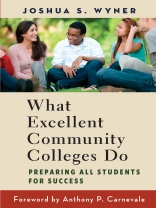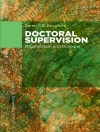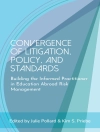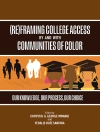In What Excellent Community Colleges Do, Joshua S. Wyner draws on the insights and evidence gained in administering the inaugural Aspen Prize for Community College Excellence.
This book identifies four domains of excellence—degree completion, equity, student learning, and labor market success—and describes in rich detail the policies and practices that have allowed some community colleges to succeed in these domains.
By starting with a holistic definition of excellence, measuring success against that definition, and then identifying practices and policies that align with high levels of student success, the author seeks to contribute to the growing body of knowledge about improving student success in community colleges.
表中的内容
CONTENTS
ix
Foreword
INTRODUCTION
1
Community Colleges
A Call to Progress
ONE
11
Completion and Transfer
Creating Clarity in a Culture of Choice
TWO
41
Equity and Developmental Education
Confronting the Tension Between Access and Success
THREE
65
Learning Outcomes
Engaging Faculty in Change They Understand
FOUR
95
Labor Markets
Tying Learning and Credentials to Jobs and Community
FIVE
117
The Community College President
Driving to Excellence in a Fast-Changing Environment
CONCLUSION
141
The Path Ahead
Urgency and Uncertainty
APPENDIX A
147 Seven Colleges Featured in This Book
APPENDIX B
155 Aspen Prize Data
159
Notes
175
Acknowledgments
177
About the Author
179
Index
关于作者
Joshua S. Wyner is the founder and executive director of the Aspen Institute College Excellence Program, which aims to strengthen practice, policy, and leadership to substantially improve college student success. Among the initiatives Wyner established are the Aspen Prize for Community College Excellence, which recognizes schools that achieve outstanding student outcomes, and the New College Leadership Project, which seeks to align the recruitment, hiring, and professional development of college presidents with student success goals.
Before starting the Aspen program in 2011, Wyner spent the previous sixteen years working to improve educational outcomes and urban policy as a leader of nonprofit organizations, including the Jack Kent Cooke Foundation and DC Appleseed. He spent his early career as an organizer and policy analyst with Citizen Action, as a program evaluator at the U.S. Government Accountability Office, and as an environmental attorney. He lives with his wife and sons in Washington, DC.












